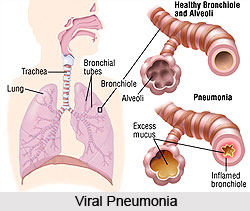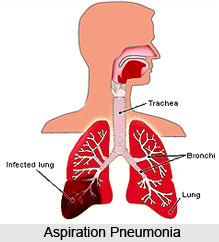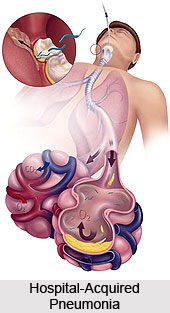 Numerous types of Pneumonia are distinguished depending on the causes and symptoms. The most important types are categorized according to the infections caused. Pneumonia is the result of effect of microorganisms such as bacteria, virus and fungi. Pneumonia is a common illness which occurs in any age. Most of the types of pneumonia are chronicle. However, vaccines are available for to prevent certain types of pneumonia. The diagnosis depends on the type of pneumonia and appropriate treatment is rendered. Pneumonia is classified in several ways mostly according to the anatomic changes that were found in the lungs during autopsies, a radiological. Thus the classification resulted into the types such as: Bacterial pneumonia, Fungal Pneumonia, Idiopathic interstitial pneumonia and viral pneumonia.
Numerous types of Pneumonia are distinguished depending on the causes and symptoms. The most important types are categorized according to the infections caused. Pneumonia is the result of effect of microorganisms such as bacteria, virus and fungi. Pneumonia is a common illness which occurs in any age. Most of the types of pneumonia are chronicle. However, vaccines are available for to prevent certain types of pneumonia. The diagnosis depends on the type of pneumonia and appropriate treatment is rendered. Pneumonia is classified in several ways mostly according to the anatomic changes that were found in the lungs during autopsies, a radiological. Thus the classification resulted into the types such as: Bacterial pneumonia, Fungal Pneumonia, Idiopathic interstitial pneumonia and viral pneumonia.
Bacterial pneumonia is one of the major types of Pneumonia which is caused by various bacteria. It is associated with bacterial infection in a human body. This type is further classified into Streptococcus pneumonia, atypical and gram negative bacteria. The Streptococcus pneumonia is the most common bacterium that causes bacterial pneumonia. Bacterial pneumonia is effects an individual when the body is weakened in certain ways, such as illness, malnutrition, old age, or impaired immunity. All these factors lead the bacteria to work their way into the lungs. This type of pneumonia can affect any individual but mostly those who abuse alcohol, who are debilitated, post-operative patients or suffering with respiratory diseases or viral infections. Persons with weakened immune systems also come under the bout of bacterial pneumonia.
Among the different types of Pneumonia, there is viral pneumonia. This kind of pneumonia mostly affects young children. The Viral pneumonia is caused by various viruses.
 Viral pneumonia feature fever, non productive cough, rhinitis, headache or myalgia. Viral pneumonias make a person vulnerable to bacterial pneumonia also. Mycoplasma pneumonia is yet another diverse type of pneumonia and portrays different symptoms and physical signs. This kind of pneumonia is caused by mycoplasmas. These are the micro organisms which are free-living agents of disease in humankind,. These micro organisms have the characteristics of both bacteria and viruses. Mycoplasma pneumonia mostly affects younger people and may be associated with symptoms outside of the lungs (such as anemia and rashes). Chlamydophila pneumonia occurs usually with a low mortality rate. Atypical pneumonia is caused due to LegionElla and has a higher mortality rate. These pneumonia attacks elderly individuals, smokers, and people with chronic illnesses and weakened immune systems.
Viral pneumonia feature fever, non productive cough, rhinitis, headache or myalgia. Viral pneumonias make a person vulnerable to bacterial pneumonia also. Mycoplasma pneumonia is yet another diverse type of pneumonia and portrays different symptoms and physical signs. This kind of pneumonia is caused by mycoplasmas. These are the micro organisms which are free-living agents of disease in humankind,. These micro organisms have the characteristics of both bacteria and viruses. Mycoplasma pneumonia mostly affects younger people and may be associated with symptoms outside of the lungs (such as anemia and rashes). Chlamydophila pneumonia occurs usually with a low mortality rate. Atypical pneumonia is caused due to LegionElla and has a higher mortality rate. These pneumonia attacks elderly individuals, smokers, and people with chronic illnesses and weakened immune systems.
Among the various types of Pneumonia, Aspiration pneumonia is an inflammation of the lungs and bronchial tubes caused by inhaling foreign material, usually food, drink, vomit, or secretions from the mouth into the lungs. Aspiration of foreign material into the lung can be a result of disorders that affect normal swallowing, disorders of the esophagus, or decreased or absent gag reflex. This is a kind of pneumonia which is common in individuals with old age, dental problems, use of sedative drugs, anesthesia, coma, and excessive alcohol consumption.
Atypical pneumonia is among those types of Pneumonia that refers to pneumonia caused by certain bacteria such as Legionella pneumophila, Mycoplasma pneumoniae, and Chlamydophila pneumoniae. Various factors result in the occurrence of CMV pneumonia. However, the most common factor responsible for the CMV disease is a common complication of organ transplantation. This occurs mainly due to bone marrow transplantation. CMV pneumonia is often present simultaneously with pneumocystis pneumonia.
There are other types of Pneumonia, such as Hospital-acquired pneumonia which is an infection of the lungs contracted during a hospital stay. It is caused by many different organisms. Hospital-acquired pneumonia is likely to be more serious because defense mechanisms against infection are often impaired during a hospital stay. Hospital-acquired pneumonia mostly affect people who are alcoholic, attained older age, experience immuno suppression from medications or diseases, recent illness, and risk of aspiration. Community-acquired pneumonia (CAP) is another serious illness. It is caused by the typical bacterial pathogens, such as Streptococcus pneumonia,
 Haemophilus influenzae, and Moraxella catarrhalis. CAP is caused by unusual aerobic gram-negative bacilli. Pneumocystis carinii pneumonia is an infection of the lungs which is caused by the fungus Pneumocystis carinii. PCP is a pneumonia caused by the fungal organism Pneumocystis carinii. Pneumocystis carinii leads to a lung infection. Individuals who suffer from advanced AIDS are affected by this pneumonia.
Haemophilus influenzae, and Moraxella catarrhalis. CAP is caused by unusual aerobic gram-negative bacilli. Pneumocystis carinii pneumonia is an infection of the lungs which is caused by the fungus Pneumocystis carinii. PCP is a pneumonia caused by the fungal organism Pneumocystis carinii. Pneumocystis carinii leads to a lung infection. Individuals who suffer from advanced AIDS are affected by this pneumonia.
Legionnaire`s disease is an acute respiratory infection which is caused by the bacterium Legionella pneumophila. This kind of disease can result in a wide spectrum of disease from mild cough and fever to a serious pneumonia. The bacteria that cause Legionnaire`s disease are found in water delivery systems and survive in the warm, moist, air conditioning systems of large buildings including hospitals. This infection is transmitted through the respiratory system. It is a contagious disease as this disease spreads from Person-to-person. The onset of the disease portrays symptoms and the condition typically worsens during the first four to six days. Most infection occurs in middle-aged or older people, although it has been reported in children. People who are at risk for more pneumonia are typically those who have impaired immune systems. Individuals suffering from HIV, transplant patients, young children, the elderly, and people taking medications to suppress their immune systems in the treatment of autoimmune disorders are mostly affected by pneumonia.




















